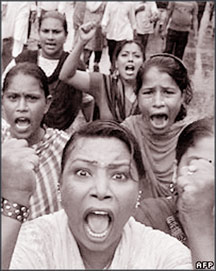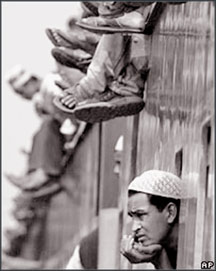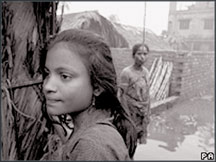Troubled waters in Bangladesh
by Tahmima Anam
In August 1947, the architects of an independent South Asia had
little idea that they were laying the groundwork for the creation of not
two, but three countries.
The two-nation theory of Mohammad Ali Jinnah turned out to be
harbinger of three nations - India, Pakistan, and eventually,
Bangladesh. And if India was built on secular lines, and Pakistan upon
religious unity, then Bangladesh was created by the linguistic and
cultural nationalism of the Bengali people.
The founding fathers of Bangladesh were also interested in another
idea, one that had yet to fully take root in Pakistan: democracy.
|

The opposition has protested against electoral corruption |
Between the 1947 partition of India and the creation of Bangladesh,
Pakistan had struggled to establish a democracy, as power passed from
one military ruler to another. On the eve of Bangladesh's birth, we
vowed to do better.
Since independence in 1971, Bangladesh has been at pains to create
democratic institutions that will weather the multiple challenges of
poverty, globalisation, climate change, corruption, and the handicap of
being a young country in a world of established military and economic
powers.
But far more than our neighbour India, the political leadership in
Bangladesh has had a troubled relationship with democracy. Again and
again the army has muscled into power.
The longest-standing example of this was the dictatorship of General
Hossain Mohammad Ershad, who ruled Bangladesh for nine years, destroying
our nascent democratic institutions and creating the foundations for the
unbridled corruption that has since hobbled the nation.
Through mass protests and a popular campaign of agitation, Ershad was
overthrown in 1991, and since then, three general elections have taken
place in Bangladesh.
For three consecutive elections, we have had a large and enthusiastic
electorate who have ushered in freely elected governments and
representative parliaments. Although young and sometimes faltering, we
have been understandably proud of our fledgling democracy.
|

Bangladesh faces an uncertain future |
But our democracy has been nothing if not deeply flawed. The last 15
years have seen each ruling party brutally repressing the opposition; in
retaliation, opposition parties have boycotted the parliament, sometimes
for years at a time. And worst of all, the accountability of our
politicians has lessened as corruption, greed, and blatant disregard for
their offices has increased without pause.
These trends laid the groundwork for the events of January 2007, when
the political landscape in Bangladesh underwent a dramatic shift.
Instead of looking forward to another chance to exercise our
democratic rights, we realised, on the eve of the fourth election, that
this election was planned and engineered to give victory to the ruling
party.
After a series of protests against electoral corruption led by the
opposition Awami League, a military-backed caretaker government stepped
in, promising to clean up the political landscape and hold free
elections.
Although the people at the helm of this shift wore military uniforms,
we applauded them, because without them we would have had a sham
election.
And when they started arresting corrupt politicians, officials and
businessmen who believed they were above the law, we still applauded
them, because those people who had been the source of institutional
decay were suddenly held accountable for their actions.
The military-backed caretaker government is heralding a series of
reforms - electoral, bureaucratic, and institutional.
|

The poor pay the price for instability |
They have also instigated reforms within the political parties, which
have begun a close examination of their party members. But the fact
remains that these reforms have not have taken place within a democratic
framework, and that raises serious questions about their long-term
sustainability.
Instead, we have a non-elected, military-backed regime performing
tasks without due process that should have been in the remit of our
political leadership.
The only way to ensure the survival of democracy in Bangladesh is if
the army does as it has promised: holds an election and returns to its
barracks.
Otherwise, even if the military cleans up the political landscape,
even if they arrest all the corrupt politicians, even if they seize the
illegal assets and raze the buildings that were made with black money,
who will become our new democratic leaders? Who will we be left to
believe in? Only those who wrested power in the first place: the army.
If they do not hand over power to elected leaders, they will emerge
as the most powerful force in Bangladeshi politics. And a victorious
army, as history has taught us time and again, is a dangerous thing. In
the meantime, as with any major political or institutional instability,
it is the poor who have to pay the price.
The monsoon floods that have hit Bangladesh are some of the worst in
recent years. Millions of villagers are marooned on the rooftops of
their homes, waiting for relief supplies, food, and clean water.
The government has made confident declarations about the food supply,
and of their own commitment to providing disaster relief.
But as everyone in Bangladesh knows, the state can only do so much in
reaching the far corners of the country. For this, they have relied
heavily on the grassroots outreach of the political parties.
With the current embargo on all political activity, the parties do
not have the liberty of reaching their constituents in rural Bangladesh.
Flood relief has not yet begun to stem the tide of hunger, disease, and
homelessness.
The floods, tragic as they are, remind us of the importance of
democratic politics in a country where the need for democracy among a
largely illiterate population has been questioned time and again.
We need a rich and well-functioning democracy, not to provide
credibility to a corrupt political system, but rather to ensure that the
state acts and exists for all its citizens, rich, poor, sheltered, or
homeless.
-Tahmima Anam was born in Dhaka, Bangladesh in 1975. She attended
Harvard University where she earned a PhD in Social Anthropology. She
lives in London. Her debut novel, A Golden Age, was published earlier
this year
BBC |
